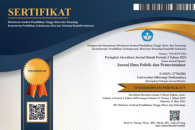MENJAUHI BUDAYA BIROKRASI BERWATAK TRADISIONAL
Abstract
This article will build an argument that the appearance of the bureaucratic apparatus which is very easy to practical political involvement, collusion, corruption and nepotism, not just a symptom of mental damage to the individual body but rather a mirror of government bureaucracy cultural mutation traditionalist character of aristocracy, politicians and corporate governance into the modern. First, the aristocratic culture of bureaucracy become the seedbed of power-managed hereditary kinship-based culture. Second, the political culture. Bureaucracy does not become a public servant but a political machine tradisonalnya succession due to the position as a social elite and technocrats modernya position of authority. Third, the corporate culture. Bureaucracy appears as a corporation as a form of political incentives to material interests. Construction of this bureaucratic culture could not be amputated just “oknumisasi†method. Reinstitusionalisasi bureaucracy should be started the Constitutional aspect, institutions, education, operationalization to strengthening public access to and control of the governmental process. This framework will be able to create an effective bureaucracy, responsible and constructive way to democratization.
Keywords
Full Text:
PDF (Bahasa Indonesia)References
Aliful Ma’arif dkk.â€Bisnis dan Demokrasi†Program Sekolah Demokrasi dan Averroes Press, Malang. 2009.
Anders Uhlin, Demokrasi di Indonesia: Peluang dan Hambatan. Dalam Jurnal Ilmu-ilmu Sosial Transformatif WACANA, No. II, Yogyakarta: Insist, 1999.
Danang Sumiharta, Institusionalisasi Hak Politik Masyarakat Dalam Proses Pembangunan, Kajian Tentang Sistem Managemen Pembangunan Partisipatif (SMPP) di Jawa Timur. Program Studi Ilmu Politik Konsentrasi Politik Lokal dan Otonomi Daerah. Pascasarjana UGM Yogyakarta 2007. Tesis.
David E. Apter, Pengantar Analisa Politik, Jakarta, PT. Pustaka LP3ES Indonesia, 1996.
Dreze, Sen, Crook, Sverrisson, dkk, â€Reformasi Politik dan Pemberdayaan Masyarakatâ€. APMD press Yogyakarta tahun 2003.
Harold Crouch, “Indonesiaâ€. Dalam Zakaria Haji Ahmad & Harold Crouch (ed.). Military-Civilian Relations in Southeast Asia. Singapore: Oxford University Press. 1985.
Hent Schulte Nordholt dan Gerry Van Klinken, â€Politik Lokal di Indonesia†KITLV-Jakarta dan Yayasan Obor Indonesia. Jakarta. 2007.
J.S. Edralin, “The New Local Governance and Capacity Building: A Strategic Approachâ€, Regional Development Studies, Volume 3. Governance. 1997.
John Scott, Rational Choice Theory, dalam edited by G. Browning, A. Halcli and F. Webster, From Understanding Contemporary Society : Theories of The Present, (Sage Publications, 2000).
Prof. Dr. Miftah Thoha, MPA. “Birokrasi dan Politik di Indonesia†PT Raja Grafindo Persada, Jakarta. 2007.
Simon Fisher, Dekha Ibrahim Abdi, Dkk, Mengelola Konflik: Ketrampilan dan Strategi Untuk Bertindak, Jakarta, The British Council, 2000.
Undang-Undang Netralitas politik birokrasi agar tidak terpengaruh politik praktsi diatur dalam UU No. 43/1999 Tentang Pegawai Negeri dan Peraturan Pemerintah (PP) No. 5 dan 12 Tahun 1999 agar PNS tidak menjadi anggota atau pengurus partai politik.
DOI: https://doi.org/10.37058/jipp.v2i1.2647
Refbacks
- There are currently no refbacks.
Copyright (c) 2021 Andi Ali Said Akbar
View My Stats











